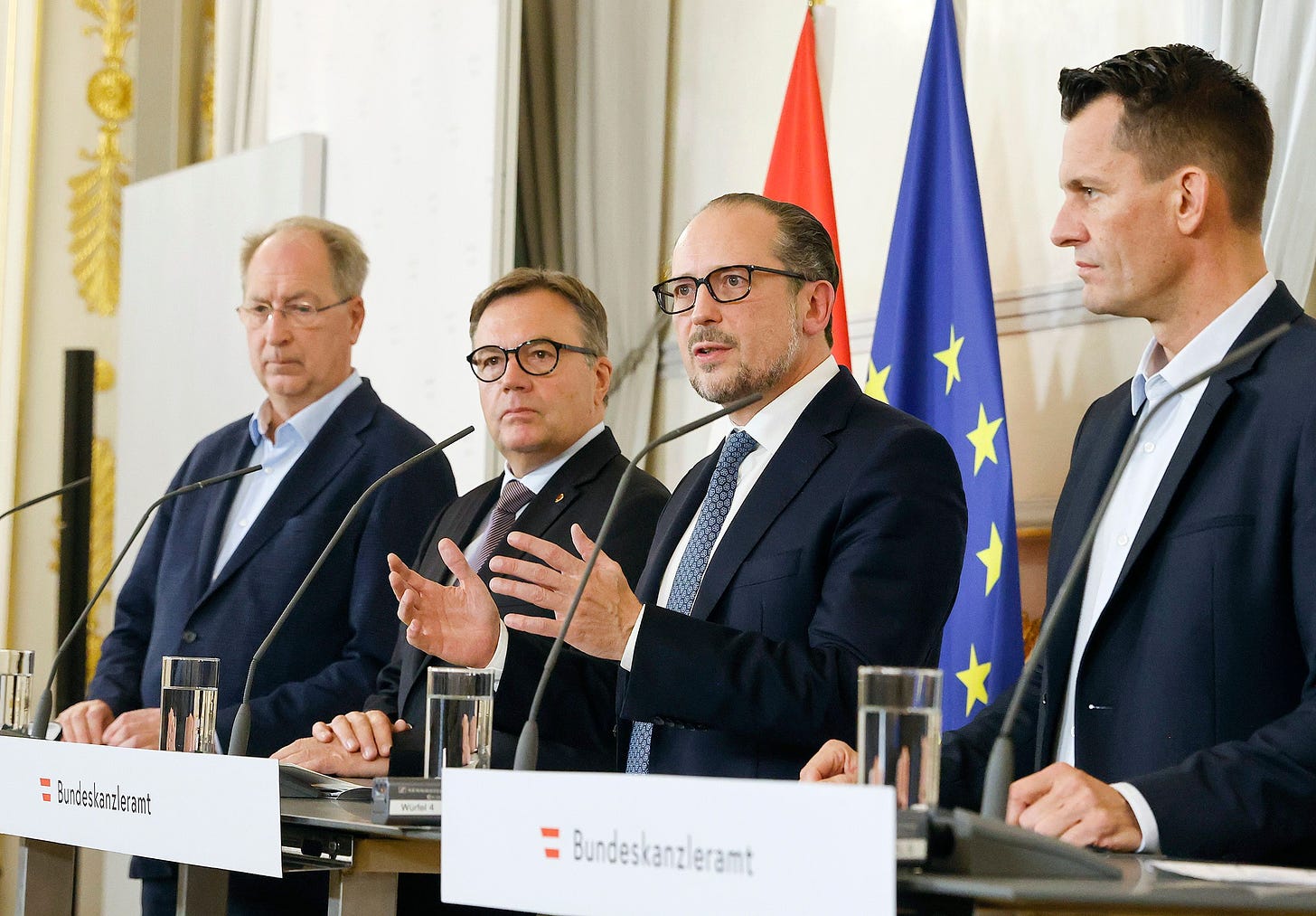Schnitzel or Bust
A partial lockdown for the unvaccinated began on Monday in Austria, a move designed to increase the vaccination rate and break the coronavirus' fourth wave

Servus!
In last week’s newsletter, I wrote to you that inconveniencing the lives of the unvaccinated may now be the only way for Austria to steer its way out of its fourth wave of the coronavirus. Since then, the situation in Austria has only worsened. On November 1, there were 58,520 active cases in the country, and the seven-day incidence rate per 100,000 people stood at 408.7; on November 8, there were 90,104 active cases and the seven-day incidence rate stood at 655.3. Faced with such a perilous, precarious situation, on Friday evening, inconveniencing the unvaccinated is precisely what the government decided to do.
After a two-hour meeting with Austria’s nine state governors, chancellor Alexander Schallenberg announced the introduction of what amounts to a partial lockdown for the unvaccinated: a so-called Schnitzellockdown. The new rules shut the unvaccinated out of the country’s gastronomic, cultural, and sporting institutions by removing a COVID-19 test alone as a valid certificate of entry. This means the unvaccinated—even if they test negative—can no longer go out for dinner, for coffee, or an after-work drink; they can no longer get a haircut or their nails done; they can no longer go to the movies or the theater; they can no longer go to the gym or a football match; they can no longer attend their friend’s wedding if it has more than 25 guests. Those joys are now the exclusive preserve of the vaccinated and those who have recovered from COVID-19.
By imposing this Schnitzellockdown, the government has in essence torn up its previous roadmap for introducing new COVID-19 countermeasures set down over the summer by former chancellor Sebastian Kurz. That plan, as I explained last week, linked the severity of countermeasures to the number of intensive care beds occupied by COVID-19 patients. Level 1’s rules in the event of 200 occupied beds had already been imposed; Level 2/300 beds was due to come into effect November 8. With this Schnitzellockdown, the government has moved from a reactive to a proactive footing, jumping straight to Level 4/500 beds.
Will this partial lockdown for the unvaccinated work? Previous lockdowns indicate we will only know that in two to three weeks time when its effects should show up in the active case numbers. It’d take another two to three for hospitals to notice its impact. As for the vaccination rate, over the weekend, runs on vaccination centers and mobile units were reported across the nation. 32,000 doses were administered on Saturday, of which around 10,000 were first doses and another 17,100 third booster shots (now recommended six months after receipt of the second dose). A sustained increase in the vaccination rate is vital to breaking the back of this fourth wave.
The Schnitzellockdown will remain in place through Christmas and the New Year, vice-chancellor Werner Kogler said over the weekend. But what if it doesn’t work, and there is no perceptible dip in case numbers in three weeks’ time? Another full national lockdown would appear to be off the table—right now at least. The government neither wishes to lock up the vaccinated nor subsidize shuttered businesses again nor sabotage the winter tourism industry. A complete lockdown for the unvaccinated, on the other hand, would be tough to enforce.
One option would be to make the existing Schnitzellockdown even stricter. Under such conditions, the recovered would also need to be vaccinated (albeit with one dose, not two), and all vaccinated patrons of restaurants, gyms, and so on would need to show both a valid vaccination certificate and PCR test certificate in order to gain entry. If not that, the only other option would be regional lockdowns state-by-state. Upper Austria—where the seven-day incidence rate has now topped 1,000—and Salzburg would be the first candidates on the block.
Bis bald!
Thank you for signing up to the Vienna Briefing. If you know someone who would be interested in receiving this newsletter, consider sharing it with them today.
Lueger Reconceived
Vienna’s monument to its antisemitic former mayor Karl Lueger is to be subjected to an “artistic contextualization,” the city’s culture secretary announced Sunday. The monument, currently covered in graffiti, has been a site of protest and contention since summer 2020.
Wall of Names
Vienna’s new Holocaust memorial—a Wall of Names noting every Austrian Jewish victim of the Shoah—was unveiled on Tuesday. Brainchild of the Holocaust survivor and campaigner Kurt Yakov Tutter, work began on the monument located across from the National Bank in 2020 and was constructed in 15 months.
Trouble in Paradise
The mayor of Lech has stepped down after only one year in office. Stefan Jochum—who toppled long-time mayor Ludwig Muxel in a surprise election victory in 2020—cited the ski resort’s divisive political atmosphere and the “onslaught” of bullying directed at him and his staff as the reasons behind his sudden resignation.



